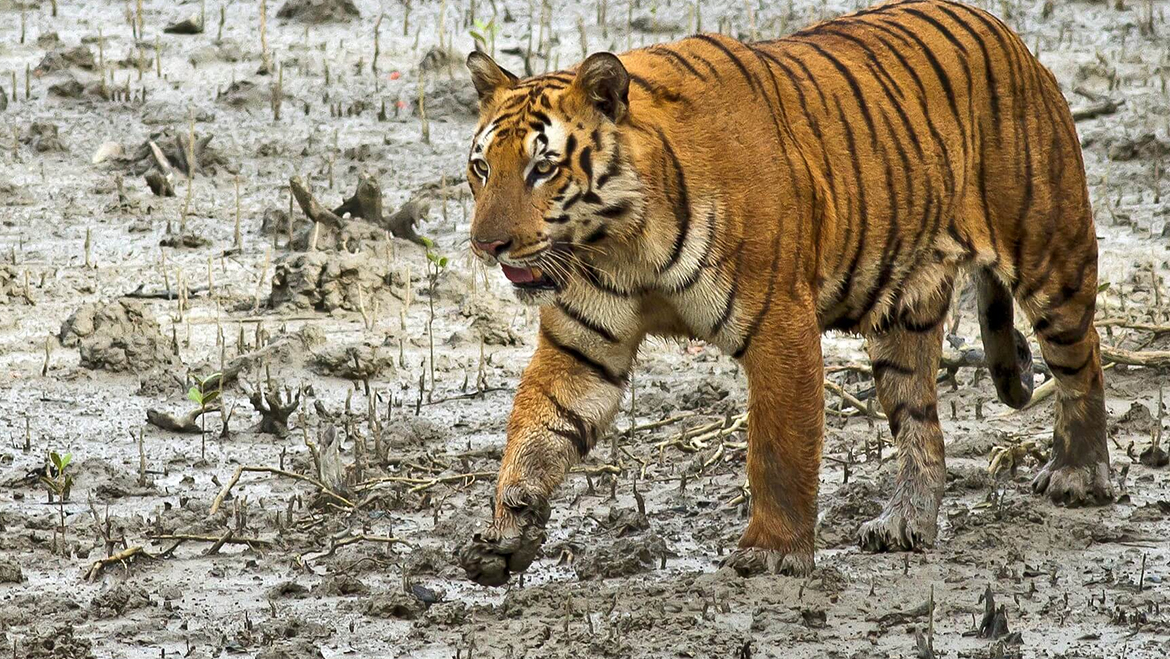


A Royal Bengal Tiger was recently spotted in a forest range in the Odisha district of Ganjam, sparking concern among residents. However, the Divisional Forest Officer has assured that the tiger poses no danger to humans as it is confined to the deep forest. The forest officials are closely monitoring the movement of the tiger and have deployed 24 teams and installed camera traps. The tiger did attack and kill six animals in nearby villages, but fortunately, no human has been harmed.
Royal Bengal Tiger Spotted in Ganjam, Odisha: Background and FAQs
Background
The Royal Bengal tiger (Panthera tigris tigris) is a subspecies of tiger that primarily resides in the Sundarbans of India and Bangladesh. In recent years, sightings of tigers have become increasingly common in Odisha, particularly in the Ganjam district. The presence of tigers in the area has sparked both fascination and concern among locals.
Current Event
On June 29, 2023, a Royal Bengal tiger was spotted in the Balukhand-Konark wildlife sanctuary in Ganjam, Odisha. The tiger was sighted by villagers near the National Highway 16, causing panic in the area. Forest officials immediately launched a search operation and installed camera traps to monitor the tiger's movement.
Tiger's Behavior and Potential Threats
According to the Divisional Forest Officer (DFO), the tiger poses no immediate danger to humans as it is confined to the deep forest. However, officials are closely monitoring its movements to ensure public safety. The tiger has been responsible for attacking and killing six animals in nearby villages, highlighting the need for caution.
FAQs
1. Why are tigers sighted outside protected areas?
Tigers often venture outside protected areas in search of food and mates. Habitat loss and fragmentation due to human activities also contribute to this phenomenon.
2. Are there any human fatalities due to tiger attacks in Odisha?
Fortunately, no human fatalities have been reported due to tiger attacks in Ganjam, Odisha, despite the recent sighting.
3. What are the efforts being made by forest officials?
Forest officials have deployed 24 teams to monitor the tiger's movement and installed camera traps. They are also working to mitigate human-wildlife conflicts and educate locals about tiger conservation.
4. Can tigers be relocated to safer areas?
Relocating tigers to safer areas is a complex and often challenging endeavor. Tigers have large home ranges and may not adapt well to new environments.
5. What should residents do if they encounter a tiger?
If you encounter a tiger, remain calm and assess the situation. Do not approach or provoke the animal. Slowly back away while facing the tiger and making noise to alert it. Seek immediate help from forest officials or local authorities.

During the Emerging Science Technology and Innovation Conclave, PM Modi announced the launch of the Rs 1 lakh crore Research, Development and Innovation Fund. This fund, under the Department of Science and Technology, aims to encourage private sector investments in R&D to drive India's vision of becoming an innovation-driven nation. With this fund, India's R&D expenditure has doubled in the last decade and the country now has the world's third-largest startup ecosystem. PM Modi also highlighted how India's domestic capability has accelerated during the COVID-19 pandemic due to its successful digital public infrastructure.

A stampede at the Kasibugga Venkateswara Swamy Temple in Andhra Pradesh has left 10 dead and two injured. The temple had recently reopened and was experiencing high footfall due to a festival. Home Minister Vangalapudi Anitha has ordered a thorough investigation into the causes of the tragedy and has promised strict measures to prevent similar incidents in the future.

India and the United States have strengthened their already strong ties by signing a 10-year framework for their major defense partnership. The agreement, signed during a bilateral meeting between the two countries' defense ministers, emphasizes the importance of this partnership in maintaining a free and open Indo-Pacific region. This marks a significant step in solidifying the bond between India and the US in the defense sector.

In preparation for a major tri-service military drill, India has issued Notices to Airmen (NOTAM) for the entire northeastern region that borders China, Bhutan, Myanmar, and Bangladesh. The first set of exercises will commence in November and continue through January, signaling enhanced operational readiness for the Indian Air Force (IAF). This move is significant as the Northeast remains a sensitive theater, making up the boundary with four countries, including China. The upcoming IAF exercises aim to strengthen India's air dominance, effectively preparing for any potential challenges along the western frontier with Pakistan.

India will conduct a 10-day military exercise in Rajasthan and Gujarat involving the Army, Air Force, and Navy to showcase its operational readiness following Operation Sindoor earlier this year. The exercise, announced through a NOTAM, features advanced military technologies and emphasises the integration of speed, firepower, and precision in desert warfare conditions. It comes amidst heightened tensions with Pakistan and a renewed focus on maintaining military readiness along the border.

Jammu and Kashmir police have filed an FIR against a group of Christian missionaries in Kathua district for allegedly attempting religious conversions through financial incentives. This comes after a video surfaced online showing the missionaries being attacked and their vehicle vandalized by villagers. The incident has sparked outrage and protests from local Hindu groups, demanding action against the accused missionaries. One accused, Ravindra Singh Thela, has been arrested while the main accused, Vivek Soni, is still at large. The police have also suspended eight personnel for failing to stop the attack.

US Vice President JD Vance, who converted to Catholicism in 2019, has revealed that he hopes his Hindu-raised wife, Usha Vance, will eventually embrace Christianity. However, he clarifies that their interfaith marriage is built on mutual respect and understanding, and that Usha has complete freedom of choice in matters of faith. The couple has found a balanced way to manage their interfaith household, with their children attending a Christian school and given the choice to be baptized.

US President Donald Trump has expressed optimism about reaching a trade deal with China "pretty soon" after a meeting with Chinese President Xi Jinping in South Korea. In addition to announcing lower tariffs on Chinese imports, Trump also stated that the issue over US access to rare earths has been resolved. However, there has been no official response from Beijing and the final decision on the sale of Chinese-owned TikTok's US operations is still pending. Analysts see these developments as a breakthrough in the ongoing trade tensions between the two countries. Our correspondents provide insight on the discussions between the two leaders and speculate on why Xi may have felt confident walking into the meeting.

At the Asia-Pacific Economic Cooperation (APEC) Summit in South Korea, Chinese President Xi Jinping and US President Donald Trump met for their first in-person talks in several years. Despite past frictions, Xi called for closer cooperation between the two largest economies in the world, emphasizing the importance of being "partners and friends." Acknowledging Trump's peace efforts in the Middle East, Xi commended his contributions and praised him as a "tough negotiator." Trump also expressed optimism for a productive discussion on trade and global security.

In a historic event, Prime Minister Shri Narendra Modi addressed the Global Maritime Leaders Conclave and chaired the Global Maritime CEO Forum at India Maritime Week 2025 in Mumbai, welcoming participants from over 85 countries. With major shipping giants, startups, policymakers, and innovators in attendance, the summit showcased India's advancements in the maritime sector, such as the replacement of outdated colonial laws with modern ones and the recognition of large ships as infrastructure assets. Amidst global tensions, India stands as a symbol of strategic autonomy and inclusive growth, ready to take on a leading role in the world's rough seas.